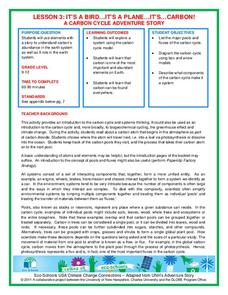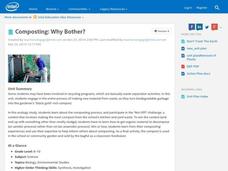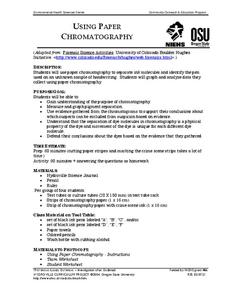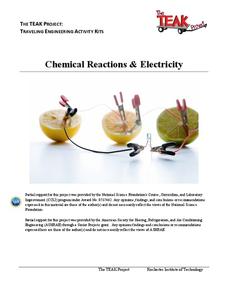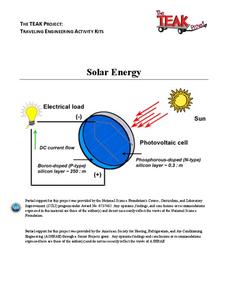Carolina K-12
Exploring the Electoral College
Does your vote really count? This activity helps young voters learn about the electoral college through a TED talk, a helpful handout, discussion prompts, and then a role-playing activity that has participants simulating an election on a...
Carolina K-12
Are You a Democrat or a Republican? Are You Really?
Have new or soon-to-be voters examine different political parties and their platforms as they figure out which one aligns most with their beliefs. After taking a few online quizzes, students split into pairs to discuss and then in larger...
Cornell University
Fibers, Dyes, and the Environment
Nanofibers can be made through electrospinning or force spinning in order to reduce the negative impact on the environment. Pupils study the role of fibers and dye on the environment through a series of five hands-on activities. Then,...
Santa Monica College
Introducing Measurements in the Laboratory
We use basic units of measurement to break down things and communicate clearly. The first lesson in an 11-part series teaches the proper way to measure various items. It starts simply with measuring the dimensions and areas of geometric...
Cornell University
Shedding a "Little" Light on Cancer Surgery
Many types of cancer treatments now depend on nanotechnology—a big "little" discovery. Scholars begin by removing "malignant" tissue from simulated brains, one using fluorescent markers thanks to nanotechnology and one without. This...
University of Kentucky
Bullying Awareness Lessons, Activities and Resources
What are the different types of bullying? What are the impacts? What is the role of the bystander in bullying? What can be done to stop bullying? These questions are addressed by the activities included in a workshop designed for middle...
Consumers Energy
Conductors and Insulators
Why did the orchestra director use a copper baton? She heard it makes a great conductor. Scholars select six items to test in a circuit to determine if each is a conductor or an insulator. Clear instructions for using electricity allow...
Curated OER
Tangible Symbol Systems
Working with children and adults who have severe communication disorders presents its own set of challenges. The goal of this resource is to provide educators, parents, and guardians with research-based suggestions for how to meet these...
New York City Department of Education
What Did I Do to Be so Black and Blue: How Did Jazz Influence Ralph Ellison's Invisible Man
How did jazz influence Ralph Ellison's Invisible Man? Class members read some of Ellison's non-fiction writings about blues and jazz, listen to records, watch videos, and engage in student-centered discussions. They then produce podcasts...
National Wildlife Federation
It's A Bird...It's A Plane...It's...CARBON!
An interesting instructional activity takes pupils on a trip through the carbon cycle. A reading passage allows scholars to take notes and make choices about what happens to the carbon on its journey. This third instructional activity in...
National Wildlife Federation
What is DBH?
When measuring the circumference of a tree, does it matter how high you place the measuring tape? Most scholars have never considered this question, but scientists know that measurement techniques must be standardized. The 13th...
National Wildlife Federation
Green Green Revolution
School budgets don't have a lot of extra money, so when students propose saving the district money, everyone jumps on board. The first lesson in the series of 21 introduces the concept of an energy audit. Scholars form an eco-action team...
Intel
Composting: Why Bother?
The first STEM lesson in a group of 10 explores composting. After discussing how to make a better tomorrow, classes are challenged to track garbage in their communities, visit a local waste management facility, and conduct a survey about...
National Park Service
It's Not Easy Being Grizz
Grizzly bears can be up to 600 pounds and require a great deal of food, especially to survive hibernation. Comprised of multiple games, the third lesson of five only uses one setup. Pupils run around a large field, sorting and collecting...
National Park Service
Nutcracker Fantasy
The Clark's nutcracker bird hides seeds in 25,000 different sites every year to save for winter. Lesson demonstrates how difficult it would be to find these seeds months later when they need them for food. In the first of five lesson,...
Code.org
Star Wars: Building a Galaxy with Code
Welcome to the code side. The interactive lesson introduces coding in a game format with familiar characters. Young computer experts learn to develop code to control the interaction of the characters in the game. The activity ends with...
US Department of Energy
Thermodynamics—Teacher Guide
I'm so cool! No, you're exothermic. This thermodynamics lab unit includes an introduction, teacher demonstrations, six labs that students rotate through each class day, homework assignments, application of knowledge, and assessments....
Consortium for Ocean Science Exploration and Engagement (COSEE)
Arctic Smorgasbord
Though the walrus spends roughly one third of its time on land, it eats organisms that live on the bottom of the ocean. The first in a series of five, the lesson uses a variety of plant and animal cards to have scholars build an arctic...
Normal Community High School
Golf Ball Lab
The first golf balls were made of wood and would only last for a few games. Modern golf balls last a lot longer but they don't float. The presentation provides the directions for a lab to determine the minimum amount of salt needed to...
PHET
The Greenhouse Effect
How do greenhouse gases impact temperature? Have your classes use the interactive software to explore different concentrations of greenhouse gases and their effect on climate. Learners can recreate different atmospheric concentrations...
Oregon State
Using Paper Chromatography
Through the analysis of paper chromatography to separate ink from the pen found at the crime scene, learners analyze the different stains and through calculations determine the thief.
NOAA
Methane Hydrates – What's the Big Deal?
Have you ever tried to light ice on fire? With methane hydrate, you can do exactly that. The ice forms with methane inside so it looks like ice, but is able to burn. The lesson uses group research and a hands-on activity to help scholars...
Rochester Institute of Technology
Chemical Reactions and Electricity
After a discussion of chemical reactions and electricity, scholars break into groups and follow a scripted activity to discover if fruit can power a clock. After a concluding discussion, the class a presented with a challenge.
Rochester Institute of Technology
Solar Energy
Warm up to the idea of solar energy. A lesson includes three activities that challenge scholars to apply knowledge in new ways. First, they learn to run an alarm clock without a battery by using solar energy. Next, they complete an...











